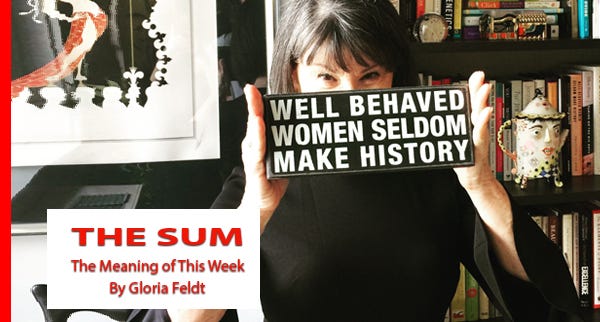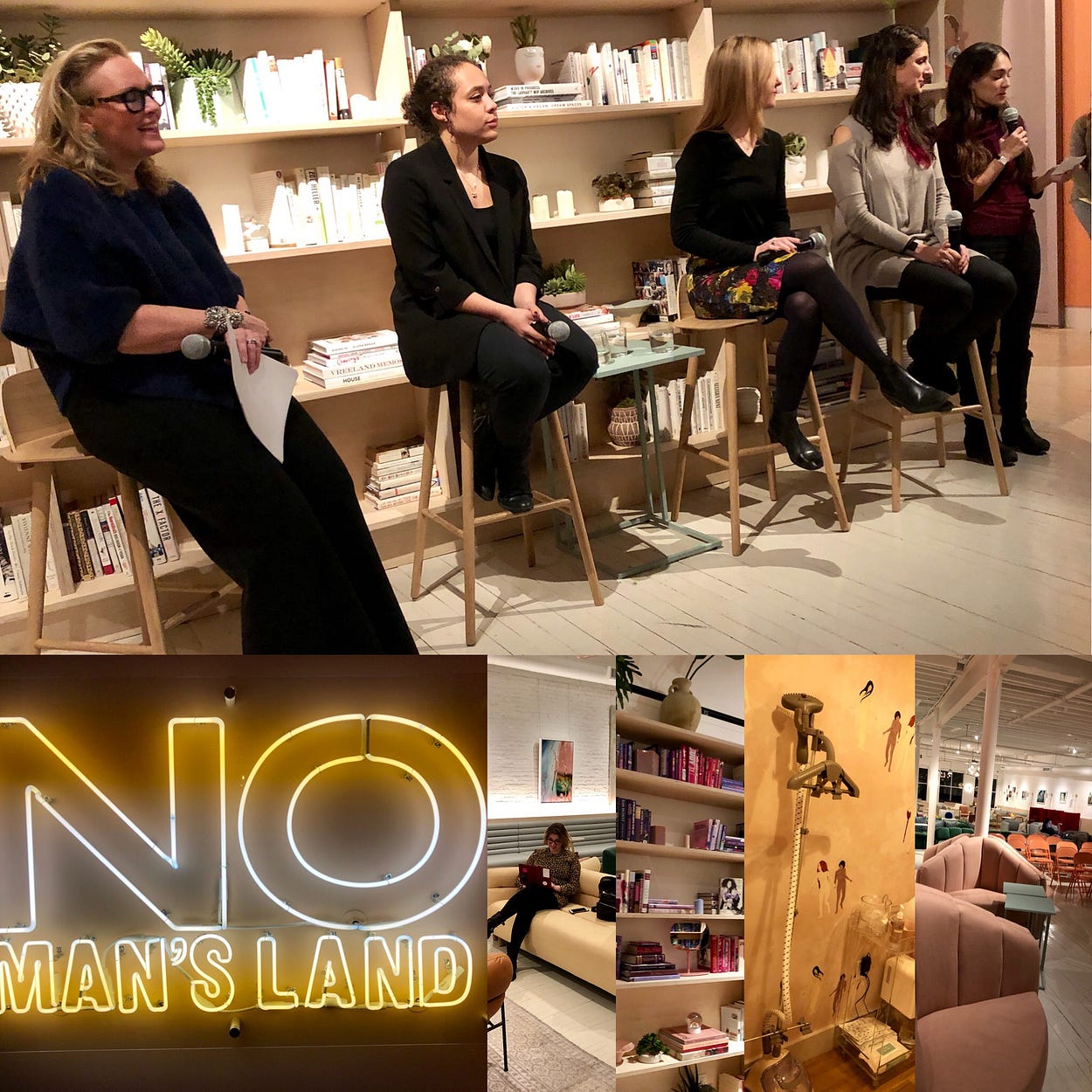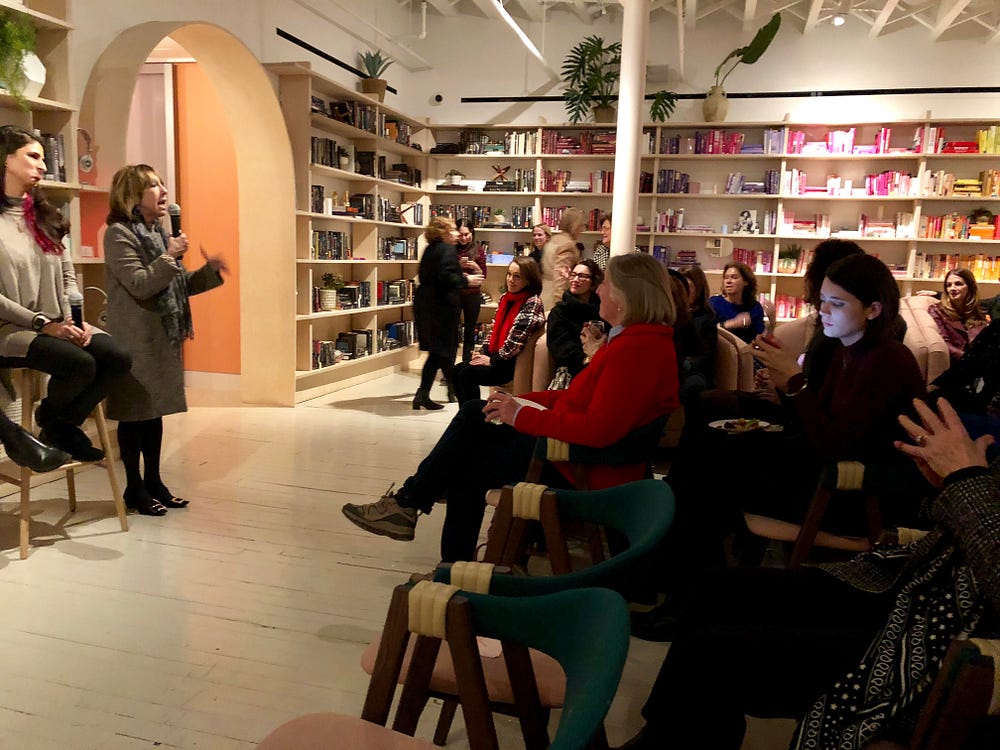The Sum: “Brave Enough” Women Create Technologies That Change Your World
Who Says Women Can’t Rule Stem?

I’m so glad I didn’t let the nasty rain and snow deter me from attending a Women’s Forum of New Yorkhosted panel called BRAVE ENOUGH: INNOVATORSTRANSFORMINGOUR WORLD at one of the fastest growing and chicest women’s workspaces, The Wing, in New York’s SoHo neighborhood.
Wing co-founder Audrey Gelman welcomed an audience that melded the Forum’s accomplished members largely of a “seasoned” generation with The Wing’s younger, edgier, up-and-coming members. “We use words like ‘badass’ a lot around here,” Gelman said. Yes, and a neon sign blares “No Man’s Land,” the name also of the Wing’s new magazine.
I think The Wing might be the real Themyscira.
Moderator and Forum member Sarah Beatty Butler barely had to throw one question at the panelists to get them going. Dr. Nina Tandon, Hahna Alexander, Dr. Leslie Dewan: these entrepreneurs are disrupting health care, battery chargers, and nuclear power respectively. Brilliantly.

The urgency, in my opinion, is this: until women are creating technologies that change how we think and live, along with wealth at the level of Bill Gates (or fill in your favorite tech giant), we won’t reach parity. Women like that will come from women like the ones on the panel.
The question is what makes an innovator “brave enough” to break through the barriers women still face to reach that rare air level?
All three panelists started by saying they were motivated by a desire to create technology that makes people’s lives better.
How typically female of them.
I asked does that help or hurt them with investors and in growing their business, and how do they think men in their chairs would have framed it. They all laughed and agreed, “The men would have started with ROI.”
So how were they succeeding in getting investors in what is clearly man’s land, no matter what that neon sign bravely declares? First, they framed it as solving a problem, not as do-gooding. Second, they sought impact investors as well as traditional ones. And they are smart businesswomen who know that if a venture doesn’t make money, it’s not going to fly in any case. Third, environment was everything — choosing the right parents as one woman in the audience observed — and mentors who helped to pave the way or created opportunities they might otherwise have not known existed.
Nina Tandon, Co-Founder & CEO of EpiBone is a renaissance woman. She values art as much as science and has studied and worked in a broad range of endeavors. Her company combines personalized medicine and a revolutionary approach in research to transform how we approach skeletal repair. This is fascinating stuff: 75% of us will be living with body parts we weren’t born with, she said, but that is a paradigm she is out to change by using our own stem cells turned into tissue and bone by a 3-D printer.
That way, we can learn to heal instead of repair our bodies. Patriarchal medicine (where you lie back and the doctor does things to you) will disappear when we shift to less invasive and more intentionally healing procedures.
Just wow.
Women experience so many cycles of life and birth and death that they seem to understand this more easily than men do Tandon observed. “Product market fit” requires gender balance in the marketplace as in society. Dr. Tandon thinks this is a productive way to bring up the importance of gender parity with those who aren’t inclined so much to consider it an important value.
And she tries to do that in the makeup of her company as well. Her board is 2/3 women — she smiled broadly about that and acknowledged it is deliberate. The science side of her company is 50/50, also deliberate. But the business side: mostly men. She frowned.

Despite how different these inventive, articulate women were in what they pursued, they were strikingly similar in the way they were raised to see themselves.
Tandon’s father said she was good at math and science so she had an obligation to other women to make sure she uses them. So she did, yet she needed many academic degrees to feel confident.
Hahna Alexander, Co-Founder & CEO of SolePower, said her parents never called her pretty; they always called her smart. She spoke to the challenges of being both female and black and the dismal statistics about how few black women have received more than $1,000,000 in investment funding.
So what does she make? Smart Boots. Her genius product uses every step you take to charge batteries that literally keep critical power available for GPS, motion sensors, Wi-Fi, RFID, and lighting. She’s been profiled on NPR and a host of other media outlets. The applications and use for what she’s doing are broad attracting interest from all kinds of industries and the military.
Dr. Leslie DeWan Co-Founder & CEO of Transatomic Power graduated from MIT and is hardcore engineer/scientist all the way. Her company has an audacious goal: she’s peeling back the nuclear power question back to its starting point and creating another solution for generating nuclear energy that is safe.
She said her father called her hardworking and that is how she has always defined herself. She proposed deep metric analyses of implicit bias to inform both men and women clearly about their own behaviors. Many times, they have no idea that they are making gender-biased investments or purchasing choices. She told about a male ally who kept track of all the microaggressions she was subjected to while making a pitch.
Such power resides in these simple words — hard-working, smart, good at math and science — and how these women all carried them as lodestones through their schooling and into their companies.
You don’t have to be a science geek to know that if we are going to break stereotypes about women not being brave enough, visionary enough, smart enough to become our next generation of tech leaders, we must support and fund female-led entrepreneurial companies such as these three. Will we be brave enough to make a conscious reset on the values that get funded — with the beneficial purpose of a new technology being the new ROI?
TAKETHE LEAD prepares, develops, inspires and propels women to take their fair and equal share of leadership positions across all sectors by 2025. It’s today’s women’s movement — a unique catalyst for women to embrace power and reach leadership parity. Join us online, sign up for our newsletter and have insightful news and advice delivered weekly, and check out our Virtual Happy Hour, our leadership programs and other offerings including our new online course set up to be done on your schedule, in your own time: Here’s how to register: Power to Lead: 9 Leadership Power Tool to Advance your Career for a life-changing 2018.
About the Author
Gloria Feldt,Co-Founder and President of Take The Lead, is the author of No Excuses: 9 Ways Women Can Change How We Think About Power. She teaches "Women, Power, and Leadership" at Arizona State University and was named to Vanity Fair's Top 200 women Legends, Leaders, and Trailblazers.
